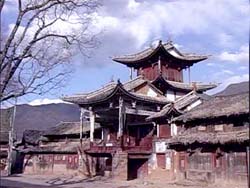|
 Of the 1,858,063 Bai people, 80 percent live in concentrated communities in the Dali Bai Autonomous Prefecture in Yunnan Province , southwest China . The rest are scattered in Xichang and Bijie in neighboring Sichuan and Guizhou provinces respectively.
Of the 1,858,063 Bai people, 80 percent live in concentrated communities in the Dali Bai Autonomous Prefecture in Yunnan Province , southwest China . The rest are scattered in Xichang and Bijie in neighboring Sichuan and Guizhou provinces respectively.
The Bais speak a language related to the Yi branch of the Tibetan-Myanmese group of the Chinese-Tibetan language family. The language contains a large number of Chinese words due to the Bais' long contact with the majority Chinese ethnic group C Han.
Situated on the Yunnan-Guizhou Plateau, the Bai area is crisscrossed with rivers, of which the major ones are the Lancang, the Nujiang and the Jinsha. The river valleys, dense forests and vast tracts of land form a beautiful landscape and provide an abundance of crops and fruits. The area around Lake Erhai in the autonomous prefecture is blessed with a mild climate and fertile land yielding two crops a year. Here, the main crops are rice, winter wheat, beans, millet, cotton, rape, sugar-cane and tobacco. The forests have valuable stocks of timber, herbs of medicinal value and rare animals. Mt. Diancang by Lake Erhai contains a rich deposit of the famous Yunnan marble, which is basically pure white with veins of red, light blue, green and milky yellow. It is treasured as building material as well as for carving.
The Bais are Buddhists and worshippers of "communal god." Dotted with monasteries and temples, Dali has been known as a "Scented Wonderland." Abbots who held huge amount of land and other property in the past were big landlords and usurers. The ordinary people were heavily burdened by this caste and by religious activities which required sacrifices of cattle and other valuables.
Monogamous families have been the basic social cells of the Bais, with a very few people who practiced polygamy. Parents live with their unmarried children, but only in big landlord families did four generations live together. Before the founding of the People's Republic of China in 1949, matches between young men and young women of the same surname or clan were not permitted, while marriages between cousins were encouraged, and were arranged by the parents. High bride prices caused many poor families to fall into debt. Women were discriminated against, and only men had the right to inherit family property. But all such feudal practices and customs have been fading away since 1949. Young people now enjoy the freedom to choose their lovers.
 China tours inclusive of visiting Dali China tours inclusive of visiting Dali
|
|